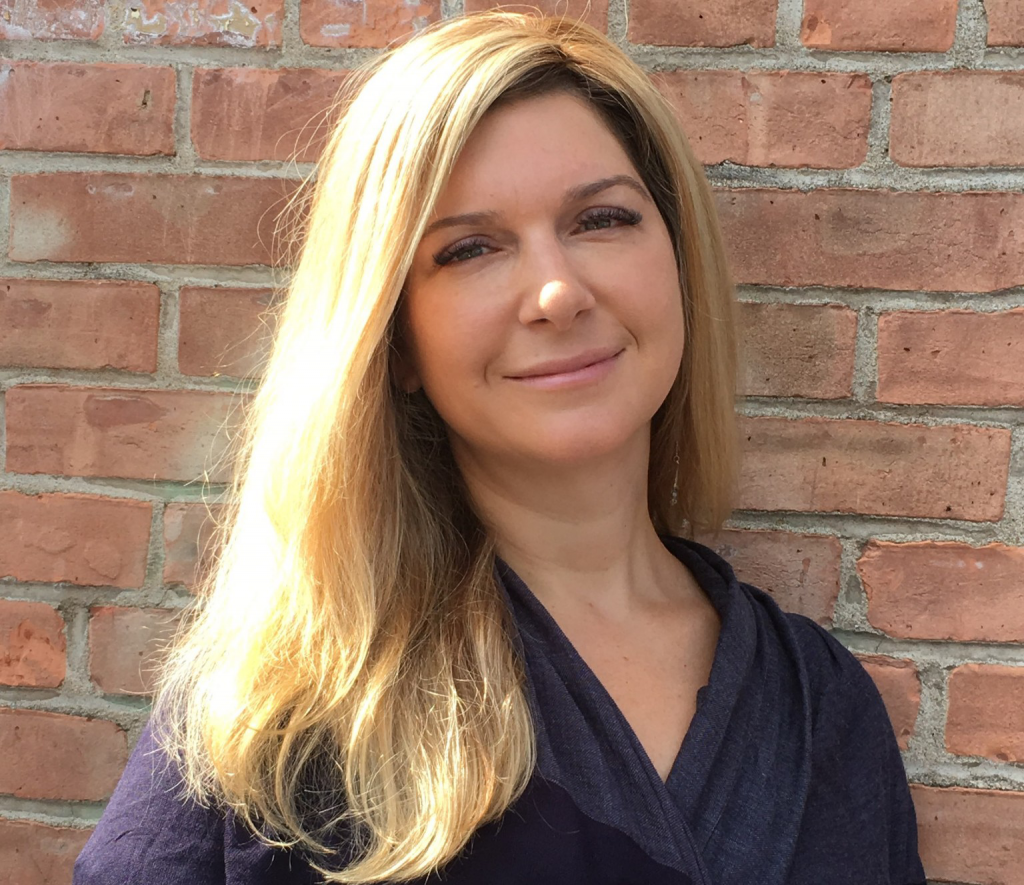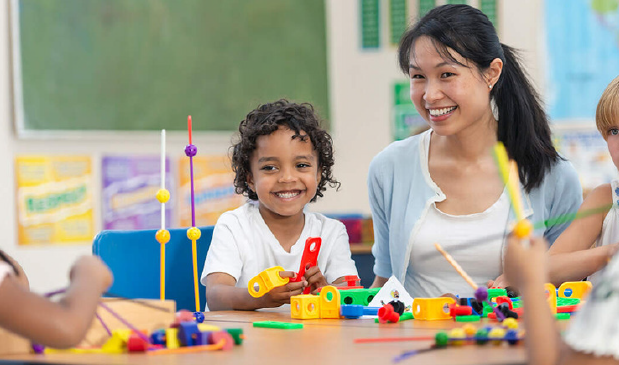As New York State slowly begins to re-open, many early care and education providers are wondering what work will look and feel like when they return to their centers. In the coming weeks, Teaching, Leading and Caring (TLC) will be sharing the perspectives of leaders of programs across the state that have stayed open throughout this crisis. We hope that this helps to light the way forward.
Tell us a little about your program.
I’ve been a director with the YMCA for the past 16 years. The YMCA is a not-for-profit 501 (c)(3) organization. We offer center-based programming at our Early Childcare Center in Scotia, NY [Schenectady County], for children 3 weeks of age to 5 years old and school-aged programs and recreational opportunities for children between the ages of 5 and 12 years old during school holidays and over the summer months. When schools began closing in March due to COVID-19 stay-at-home orders, we immediately began offering school-aged programming to assist working parents. Being considered an essential service by New York State, we have stayed open throughout the duration of the pandemic. Typically we have approximately 71 early-learning children, 60 school-aged summer camp children and offer spaces for school vacation care throughout the year. However, due to the effects of COVID-19, our participation has declined to a total of about 48 children total per week.
Many educators are curious about what it’s like to run an early childhood program at this time. What would you like to share with them?
There definitely have been a few challenges, but once we developed new health and safety procedures, we adapted quickly and it became business as usual for the most part. For example: Our drop offs and pick ups are all done outside; we take temperatures of parents, children, and staff before they are permitted to enter our buildings; only staff and children are allowed into the facilities, outside vendors and parents are not; staff must always wear masks when inside the facility. Property Directors disinfect the buildings each evening and staff disinfect surfaces throughout the day; we use the Tadpole app to send parents pictures and videos of their children and curriculum summaries to help ease parents’ minds and keep them connected to their children.
While switching up routines, implementing new procedures and adapting to this new world of childcare may seem daunting at times, once applied, it is easy to adjust to. Our children and staff have been both resilient and adaptable and our parents have been, too. These times have required a lot of innovation and outside-of-the-box thinking, but it has brought me the greatest joy to see our community come together to make strong and safe programs for our children.
Are you experiencing financial challenges as a result of serving fewer children?
Fortunately we are considered an essential service and received a grant from Schenectady County to serve school-aged children. Many of our parents have kindly chosen to continue paying for their child’s enrollment, even if their child has not been attending our services. It has been wonderful to receive such great support from our families. Every week more children are enrolled as jobs begin to open up again and parents are returning to work or are feeling safer and simply seeking childcare.
Do you have any sage advice for directors who are considering reopening right now?
First and foremost, reopening is less scary than it may appear to be, although it does require thought, careful planning and restructuring. I have sat in on calls with educators from facilities that have been closed throughout New York State, and there is a noticeable fear behind the thought of reopening. I feel that facilities that have remained closed throughout the pandemic struggle more with the thoughts of the challenges and rebuilding that lie ahead because they have yet to overcome them. I am empathetic to that, those of us who stayed open since the beginning were feeling the same way when this all started.
The good news is that sites that have stayed open have created models to follow and choose from, PPE and cleaning supply resources are slowly becoming more available, and there is a better understanding of how this disease operates and how to protect against it. Outside of reaching out to organizations and facilities in person, there are also many resources online. I would encourage educators to do a good amount of homework before reopening and research reopening plans and procedures that have been instituted at other sites. QUALITYstarsNY has been an excellent resource for us and the QUALITYstarsNY Learning Community has offered us a tremendous amount of support, including the sharing of forms and policies.
It is important to be patient, compassionate and understanding of the concerns of both parents and children. This may be a scary time for them and we as educators and childcare providers need to remain sensitive to that and design our programming and maintain our facilities in a way that will allow the families that utilize our services to both be and feel safe.
Given all this change, what has remained the same about leading an early childhood program?
Almost everything has stayed the same, other than not allowing outside vendors and parents into our buildings, the almost obsessive cleaning, and constant use of PPE. Our mission has always been to help our community and while we have continued to do that, I feel that we have excelled when given the opportunity to take it to a new and necessary level.
What has been a source of strength/support to you during this time?
QUALITYstarsNY has been our rock throughout the storm. I feel this pandemic has brought educators closer together from across the state and that there is an understanding amongst all of us that we can find creative solutions to overcome the present days’ obstacles through supporting each other and working together.
Our YMCA staff have been a source of strength and support as well. When readying our programs for the day, it doesn’t feel like work, instead it feels like we are accomplishing a larger mission that is the basis of the YMCA organization: supporting our community. We may not be medical staff, yet we are still a form of front line worker offering care, refuge and necessities to the parents and children in our community who need it the most. Our staff understands that mission and has exemplified it on a daily basis, not only to the participants within our programs, but amongst each other as well. Even in the turbulence and unknowingness of these times, they have upheld an amazing attitude, creating a workplace that feels safe, secure, and willing to listen. Staffers have expressed that they feel that they can talk openly about their feelings and concerns, and with that open communication, it’s been a good experience for all of us.
What social distancing techniques are you using?
The best we have been able to do in our particular situation has been to keep group sizes to a minimum. Our most proactive measures have been through the reduction of risk by mandatory use of PPE, stringent cleaning/disinfecting procedures, and by limiting exposure.
What changes or challenges have you encountered with training staff, children, or families?
In the beginning of the New York COVID-19 outbreaks, our greatest challenge was learning to see beyond the veils of fear and uncertainty to better focus on grounded responses and planning rather than reaction. How could we effectively, yet safely, continue [operating] quality early childcare programs in enclosed building spaces where it is not possible to distance ourselves from our younger participants? The answer was to create solid planning and strict guidelines for staff to follow, both for their own safety and for the safety of the children and families that attend our programs. Once protocols were developed, staff were trained and took to them readily. We had initially had had some struggles with acquiring PPE and cleaning supplies, but we were able to make do with what we had stocked up until more came through.
Due to the initial uncertainty surrounding COVID-19, some of our staff described themselves as becoming distressed and suffering from anxiety or depression. The reduction of work hours and events at home only helped to multiply these effects. We, as an organization, recognize that the excellence of our programs begins with our staffing and offered whatever support was necessary. For those that were struggling with income, we provided meals. For those who needed emotional support, we maintained our “open door” policy. To bring in new and uplifting perspectives, we held Zoom conferences between motivational speakers and staff. It felt like there were some mountains to climb in the beginning, but we could see what was necessary, and did everything in our power to provide it. As a result, I feel that amongst staff members, there has been newfound strength and bonding. There is a positive energy shared amongst our team that has exceeded all expectations.
What message would you like to send to state leaders about the needs of the early care and education field in New York State right now?
The need for recognizing the efforts of education staff is something I have always been passionate about and advocated for throughout the entirety of my career. I truly hope that our state leaders are aware that educators have willfully risked their health and their family’s health by continuing to work, yet do so for the good of the children and their families. Even though they have been deemed by the State of New York as “essential,” many of these workers are being paid a lower wage and do not receive hazard pay for their extraordinary efforts to keep programs running and providing a necessary service to the families and children in our local communities. It is important for state leaders to recognize that these types of programs should not simply be considered “babysitting,” but instead that they are part of a well-organized and structured educational platform. Staffers are educating and interacting with children during a critical age where brain and physical development can be significantly affected. These teachers are providing education and guidance that creates the foundations of learning for these children, now and into the future. Despite any of the initial setbacks and challenges, education staff has adapted and truly shone during this time. Ultimately, I desire that state leaders see the true value in early care and education, as well as the amazing staff who are the backbone of these types of programs.
What questions do you have for educators whose programs are currently open? Please share in the comments section below.
Andrea Bruno is an Early Childhood Coach on the New York Early Childhood Professional Development Institute’s coaching team.




Hi Sylvia,
Please see today’s blog post for information about social distancing: https://earlychildhoodny.org/blog/perspectives-on-reopening-2/
Thanks,
Alyssa
How are you implementing social distance among the children?
We need more detail about how the classroom functions. Daily life in a classroom. Group sizes, activities, children in “bubbles”, interactions between children and with teachers, use of materials.
Social distancing?